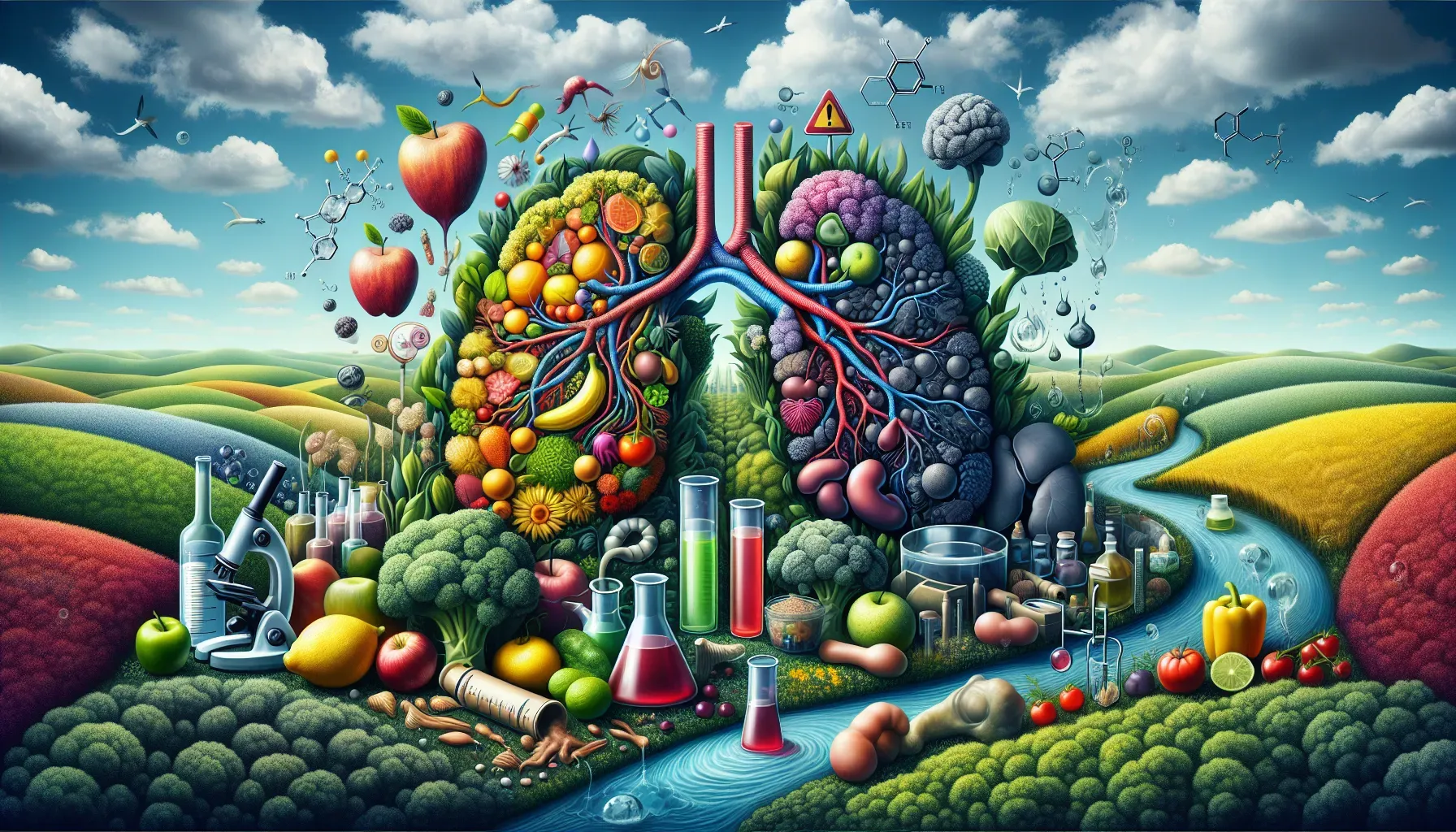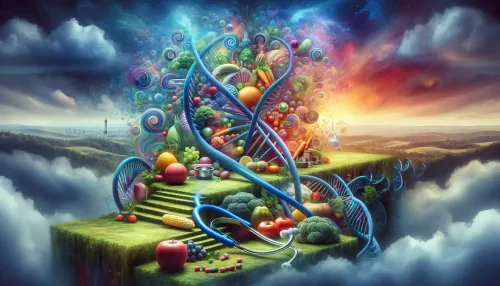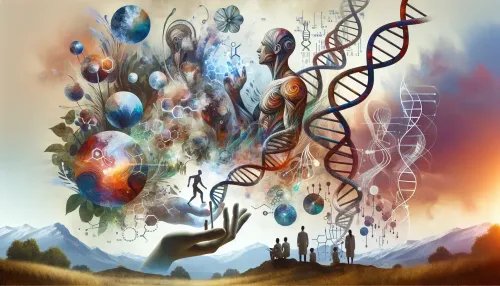Dispelling the Myths of Detox Diets: Facts Versus Fiction

For individuals seeking to improve their health and wellness, the concept of detoxification has gained significant attention. Detox diets often claim to cleanse the body of toxins, promote weight loss, and enhance overall well-being. However, it's crucial to separate fact from fiction and gain a thorough understanding of this popular trend.
Detoxification, in biological terms, refers to the process by which the body eliminates toxins and waste products. This encompassing process is predominantly managed by the liver and kidneys, essential organs that filter and eliminate harmful substances from the body. While the body has its natural detoxification mechanisms, some advocate for supporting these processes through specific dietary interventions.
Understanding Detoxification: The Physiological Basis
A multitude of detox diets have emerged, each promoting unique health benefits such as improved energy, clearer skin, and weight loss. These diets often emphasize increasing consumption of fruits, vegetables, and water while restricting processed foods, sugar, and caffeine. Furthermore, some advocate for incorporating supplements or consuming solely liquid-based meals for a designated period.
Popular Detox Diets: Claims and Benefits
In recent years, juice cleanses, water fasting, and various herbal detox regimens have garnered significant interest. Advocates suggest that these protocols facilitate the elimination of accumulated toxins from the body, thereby purifying it. However, it's essential to examine these claims through a scientific lens to discern their legitimacy.
Related Article: The Science of Sleep: Optimizing Your Rest for Health and Vitality
What Are Juice Cleanses and Water Fasting?
The liver plays a pivotal role in metabolizing toxins, rendering them less harmful and facilitating their excretion from the body. Additionally, the kidneys filter waste products from the blood to produce urine for their expulsion from the body. These intricate processes underscore that the human body possesses innate mechanisms to manage detoxification without relying solely on external dietary interventions.
The Liver and Kidneys: Natural Detoxification Roles
Scientific research regarding the efficacy of detox diets has yielded varied results. While some studies suggest that certain dietary modifications can support natural detoxification processes, others cast doubt on the drastic claims associated with many popular detox regimens.
Notably, there is limited concrete evidence supporting specific detox diets' purported benefits. Rigorous scientific scrutiny often reveals that any short-term weight loss associated with these diets is primarily due to reduced caloric intake rather than true detoxification effects. Thus, skepticism arises regarding whether detox diets genuinely deliver long-term health improvements.
Related Article: Sleep Science Breakthroughs: Enhancing Rest and Recovery Methods
Scientific Evidence on Detox Diet Effectiveness
Extreme forms of detox diets can pose potential risks to an individual's well-being. Rapid weight loss resulting from severe caloric restriction may lead to nutritional deficiencies and disrupt metabolic balance. Additionally, prolonged fasting or excessive reliance on diuretics can adversely affect electrolyte levels and compromise overall health.
Moreover, certain detox supplements may interact with medications or exacerbate underlying health conditions. Therefore, it is imperative for individuals considering such practices to consult healthcare professionals to mitigate potential risks.
Risks of Extreme Detox Diets: What to Know
Health experts advocate for sustainable lifestyle practices rather than extreme dietary interventions for optimal detox support. Emphasizing regular physical activity, adequate hydration, a balanced diet rich in fruits and vegetables, and sufficient sleep represents a holistic approach that facilitates natural detoxification processes.
Additionally, maintaining a healthy body weight and refraining from smoking and excessive alcohol consumption significantly contribute to supporting the body's inherent detox mechanisms.
Numerous myths surround detox diets that require clarification through empirical evidence. Despite claims of expelling specific "toxins" from the body through these diets, scientific literature reveals a lack of consensus regarding what these toxins precisely entail or how these diets effectively target them.
Sustainable Practices for Supporting Detoxification
Furthermore, assertions that certain foods or supplements possess magical "detoxifying" properties are frequently unfounded. Differentiating between marketing ploys and substantiated scientific facts is essential in scrutinizing detox diet narratives.
Concentrating on maintaining a nutritious diet replete with antioxidants, fiber-rich foods, lean proteins, and healthy fats supports overall health while indirectly aiding natural detoxification mechanisms. Additionally, reducing intake of processed foods high in sugar and saturated fats reduces unnecessary toxin exposure while alleviating strain on detox organs.
Common Myths About Detox Diets Debunked
It is paramount to comprehend that consistent adherence to a balanced diet yields sustainable benefits as opposed to intermittent reliance on extreme dietary measures promoted by many detox regimens.
Amidst diverse testimonials extolling the virtues of various detox diets, critical evaluations underscore a lack of universal efficacy in achieving sustained health improvements. Individual experiences with these regimens often oscillate between short-term vitality enhancements and eventual relapses into prior habits without lasting benefits.
These insights underline that fundamental lifestyle modifications are pivotal for holistic improvements rather than short-lived alterations typified by many trendy detox programs.
Nutritional Guidance for Natural Detox Enhancement
In summation, while aspects of popular detox diets align with healthy dietary recommendations—such as increased consumption of fruits and vegetables extrapolating exaggerated claims about cleansing hidden toxins necessitates circumspection.
Ultimately, adopting sustainable lifestyle habits encompassing balanced nutrition, regular physical activity, ample hydration, adequate sleep, and stress management remains pivotal for supporting holistic health and inherent detoxification processes within the human body.
Real-Life Experiences with Detox Diets: Insights and Outcomes
Navigate your wellness journey with prudence; embrace science-based dietary choices; approach grandiose claims within resplendent caution - sustaining wellness isn't found in quick fixes but in unwavering lifestyle choices rooted in comprehensive awareness.
Frequently Asked Questions
Popular detox diets claim to provide various health benefits, including improved energy levels, clearer skin, and weight loss. They typically promote increased intake of fruits, vegetables, and water while restricting processed foods and sugars. However, it's essential to evaluate these claims critically and consider scientific evidence regarding their effectiveness.
Detox diets are often labeled as pseudoscience because many claims lack substantial scientific backing. While some aspects align with healthy eating practices, the exaggerated assertions about cleansing toxins are not supported by rigorous research. Sustainable lifestyle changes are more effective for health than relying on extreme dietary measures promoted by these diets.
Individuals can support natural detoxification by adopting sustainable lifestyle habits such as maintaining a balanced diet rich in fruits, vegetables, and lean proteins. Regular physical activity, adequate hydration, sufficient sleep, and stress management also play crucial roles in enhancing the body's innate detox mechanisms without resorting to extreme diets.
Check Out These Related Articles

Epigenetics and Lifestyle Medicine: Redefining Our Genetic Destiny

Microbiome Insights: Revolutionary Findings on Gut Health and Its Impact on Mental Well-Being

Gene Editing for Well-Being: The Promising Frontier of Epigenetic Medicine
